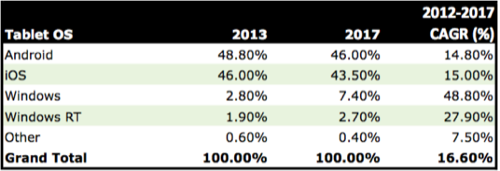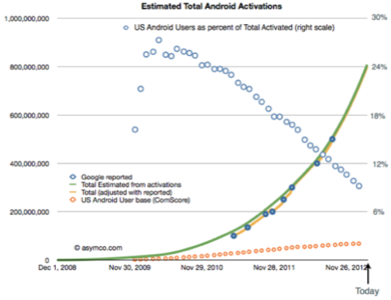
It’s déjà vu all over again in Apple Land.
Steve Jobs took the stage in 2010 to trumpet the iPhone’s dominance in the smartphone market. A few short months later, that dominance was gone. In 2011, with Android consuming Apple’s market share, Jobs pilloried Android for its anemic market share, boasting 90% market share for the iPad. He also sardonically labeled 2011 the “year of the copycats,” calling out Samsung and everyone else that wasn’t Apple.
Two years later, the copycats have basically won, according to a new forecast from IDC:

It turns out that those smaller, cheaper tablets that Jobs derided as “D.O.A.” are actually alive and well — and this year should account for one of every two tablets shipped.
None of which is to denigrate Apple, which makes the device upon which I’m typing this post. Rather, it is to echo Jay Yarow in suggesting that Steve Jobs’ reality distortion field is needed more than ever. With a stock price that has plummeted off its peak and real questions being raised about Apple’s future, Apple needs a Jobs.
Or maybe it just needs to think different.
For example, Apple needs to figure out how to be relevant outside North America and Western Europe, where people can’t afford to pay a premium for iPads and iPhones. As Asymco analyst Horace Dediu reveals, 99.4% of Android’s growth is outside the U.S., with that growth 150 times faster than U.S. Android growth:

Apple needs to answer this global demand for devices, and keeping with a high-price, high-margin strategy isn’t the right answer.
However much Apple or its fans point to Apple’s profits, Samsung, in particular, is catching up. Profit share follows market share, particularly when competitors like Samsung can not only build cheap Android devices but also high-end Android devices that are equal to or better than Apple’s devices. Android is already eating into Apple’s profit margins, pushing it to release smaller, cheaper devices that generate smaller profits.
So maybe Apple is thinking different. But it needs to accelerate this. And not just in the U.S., which is one of the few markets where users can get the lower-end Apple devices (e.g., iPhone 4S) heavily subsidized.
John Paul Titlow argues that Apple needs to go for broke with iOS 7. Given the innovation we’re seeing from Google with things like Google Now, that’s a great suggestion, but a jump in iOS innovation may merely be table stakes.
(See Microsoft Is Basically Screwed In The Tablet Sector, IDC Says.)
Apple needs to play the market share game. Wholly fixating on profit margins has kept it from aggressively targeting the global market where most of the growth is, now that the Western world is largely saturated with smartphones and, increasingly, tablets. Could Apple build lower-end devices that manage to maintain Apple’s polish and design flair? Of course it could.
The only thing holding Apple back is an unwillingness to think different.

















